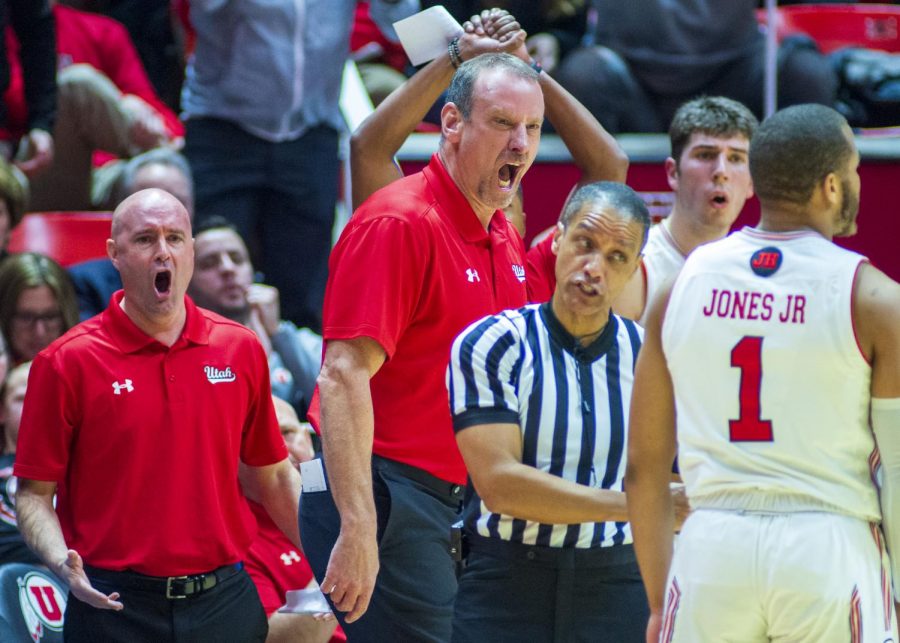Officiating the Officials
University of Utah head coach Larry Krystkowiak reacts to a call by a referee during an NCAA Basketball game vs. The University of Washington at the Jon M. Huntsman Center in Salt Lake City, Utah on Thursday, Jan. 10, 2019. (Photo by Kiffer Creveling | The Daily Utah Chronicle)
February 8, 2020
I’m not going to pretend that it’s glamorous being a referee. It is not an easy job. You have to deal with players, coaches and angry fans. No matter what decision you make, at least half of those watching the game will think it was the wrong decision. This phenomenon is especially difficult for the referees on the road. With all of that said, however, they should still receive fair criticism.
During the University of Utah men’s basketball’s recent road loss against Arizona State, such officiating came into question. With only a short amount of time left in the game and with Arizona State holding onto a dominant lead, the U’s Matt Van Komen was whistled for a technical foul following a dunk. The referees announced that he had hung onto the rim too long, which is an automatic technical foul. Head coach Larry Krystkowiak was furious at the call, claiming that a player can hang onto the rim if there is a player underneath him in order to prevent injury. The referees gave Krystkowiak a technical as well for his criticism and then ejected him from the game.
The story didn’t end there. Following the game, Krystkowiak commented about his dissatisfaction with the officiating. The conference took aim at Krystkowiak following this event, claiming that it is against conference rules for a coach to publicly comment about officiating.
This brings us to an important question: why? Why can’t coaches publicly announce their dissatisfaction with officiating? I think that the biggest reason for this is so that there is a clear hierarchy. The players and coaches must respect the officials because if they don’t, the game could easily delve into madness. When a technical foul doesn’t mean anything anymore, what’s to stop players and coaches from a play that’s too aggressive?
The officials must be respected, this is true. However, I think that there is a larger problem at play here. If coaches and players can’t voice their dissatisfaction with calls the referees make, what will ever convince the referees to do a better job? When players and coaches know that a call is wrong, I think that they have a duty to respond accordingly. Mouthing off about it to the media may not be the most effective way, but it does bring attention to mishandled calls.
I can understand both sides. You can’t have anarchy ruling the games with no respect for those given power to mediate the game, but you also can’t reprimand a player or a coach simply for voicing their dissatisfaction.
The Pac-12 especially struggles with this. It is no surprise that a large amount of the country is in agreement that Pac-12 referees are, to put it kindly, not always the most effective. If coaches publicly decry the officials as well, it validates the country’s opinion of referees in the conference, and that alone is a nightmare for Larry Scott.
Ejecting Krystkowiak was the right call during the game. It should have been done. You can’t allow tensions to flare too high during a game. With that said, however, he did not deserve a public reprimand for calmly asserting his opinion after the game. If a coach or player feels that they were wronged during a play or during a game, they should have every right to say so, especially in a calm, dignified manner, after the game — not during an actual game.
Referees are important. They keep peace and order during games and ensure that the outcome, in general, is fair. That does not mean that they are infallible. Referees make mistakes, and I’m sure that sometimes they let their emotions get the best of them and make rash decisions. Everybody does.
The problem is that when they deny people the opportunity to criticize them calmly, they build a barrier between them and make tensions worse. If coaches don’t feel like they have the opportunity to express their opinions on calls, then coaches and players won’t respect the calls anyway. They will only grow to resent the officials and the conference.
There are proper channels for the coaches and players to go through in order to change rules and gain clarification, but as long as the players and coaches are not being vitriolic toward the officiating crew, there is no reason for them to be silenced. They have every right to defend their players, their team and their livelihood publicly. Everyone does.








